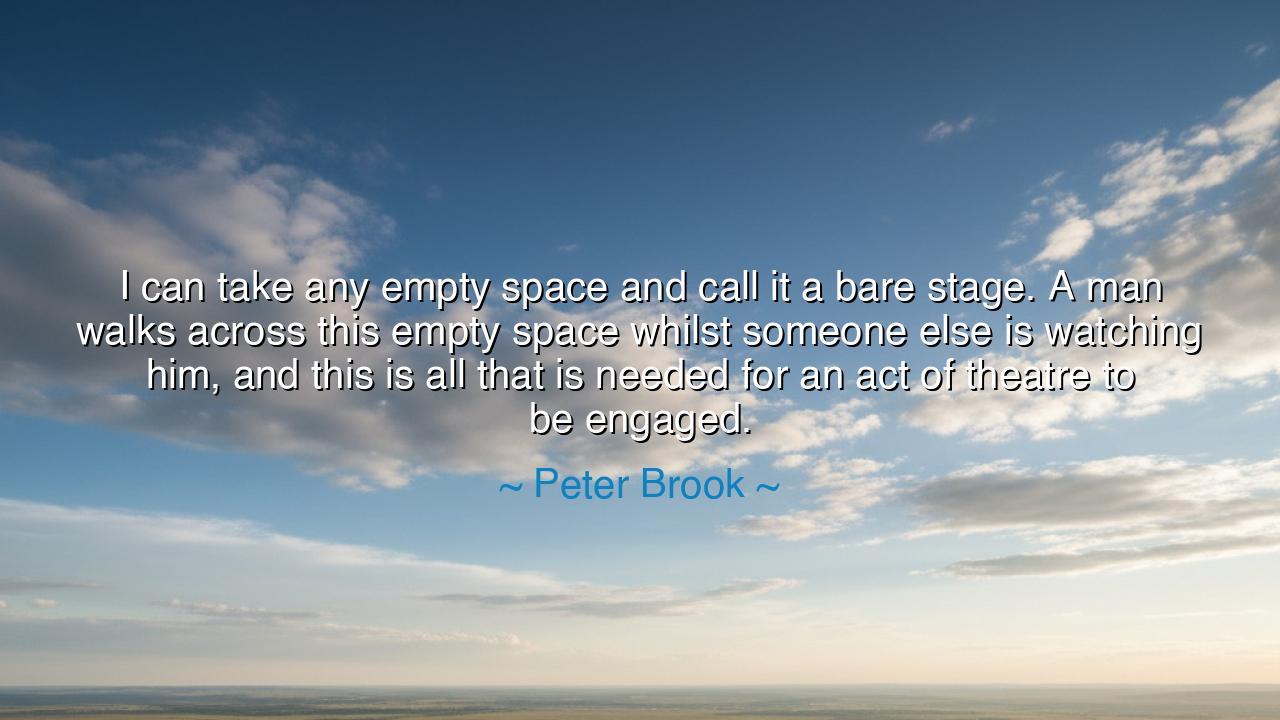
I can take any empty space and call it a bare stage. A man walks
I can take any empty space and call it a bare stage. A man walks across this empty space whilst someone else is watching him, and this is all that is needed for an act of theatre to be engaged.






Listen now, O children of wisdom, to the words of Peter Brook, a master of the stage who understood deeply the essence of theatre and its power to touch the soul. He spoke thus: "I can take any empty space and call it a bare stage. A man walks across this empty space whilst someone else is watching him, and this is all that is needed for an act of theatre to be engaged." These words, though seemingly simple, reveal a profound truth about theatre, performance, and the human spirit. Brook reminds us that theatre is not about the grandeur of the set, the opulence of costumes, or the elaborate special effects. It is about presence, human connection, and the act of witnessing.
At the heart of Brook’s statement is the idea that theatre is born from the most basic human experience: the act of one person stepping into a space, and another observing them. All the magic of theatre, he suggests, can arise from the most humble of beginnings. A man walks across an empty stage, and in that simple movement, a story is born. It is the connection between the performer and the audience that creates the space of theatre. In that moment, the air becomes charged with meaning, and a transformation occurs. This is the power of performance: to take something as simple as an empty space, and to imbue it with life, emotion, and story.
Consider the ancient Greek playwrights, whose theatre was a sacred space where the lives of gods and mortals were played out. In those great open-air theatres, there were no extravagant sets or complex technologies. A simple chorus, standing in a circle, would sing of the gods and the fates of men. Yet, in that simplicity, profound truths were conveyed, and the audience was swept up in the power of the human voice and the human body telling a story. The act of theatre in those times was not bound by material things, but by the presence of the actors and the willingness of the audience to engage. As Brook says, all that was needed was an empty space, a performer, and a witness.
This truth is no less applicable to the story of Shakespeare, whose plays have transcended the centuries. In the early days of the Globe Theatre, the space was open and bare, the actors relying solely on their words and gestures to bring the world of their plays to life. There were no modern effects, no intricate designs; just the raw power of human expression. Shakespeare’s characters, with their flaws, triumphs, and passions, became real in the minds of those who witnessed them. In those humble, empty spaces, the stories were born, and the actors were transformed into gods and kings, lovers and villains. The simplicity of the stage, combined with the power of human storytelling, created a magic that lives on to this day.
Brook’s words also remind us of the profound power of observation. Theatre is a communal experience, but it is also deeply personal. The act of watching, of witnessing a human being perform before us, brings forth a connection that transcends the empty space. When we watch a performance, we are not mere observers; we become participants in the story. Through the act of witnessing, we share in the joy, the sorrow, the triumph, and the tragedy of those who perform before us. It is this shared experience that makes theatre so unique, for in that moment of connection, we see not just the actor, but ourselves reflected in their movements, their words, and their emotions.
The lesson here, O children, is not just about theatre, but about life itself. We all stand on a stage, every day, whether we recognize it or not. We walk through the world, and others are watching us, just as we observe others. The true power of life, like theatre, is found not in the grandeur of external things, but in the small, seemingly insignificant moments where we connect with each other. Every act of kindness, every word of truth, every gesture of love is a performance that brings meaning to the space we occupy. Life itself is a stage, and each of us has the power to create meaning, to engage those around us, and to transform the space in which we find ourselves.
And so, O children of wisdom, take these teachings into your life. Do not wait for grand stages to show your worth. You need not wait for a perfect set, a perfect moment, or a perfect audience. Take the space you have — however small, however bare — and make it your stage. In every action you take, in every word you speak, there is the potential to engage the world and to create meaning. The true art of life is not in waiting for the perfect conditions, but in recognizing that every moment, every encounter, is an opportunity to perform with purpose. Embrace this, and in the empty spaces of your life, you will find a stage upon which you can bring forth your greatest performances.






AAdministratorAdministrator
Welcome, honored guests. Please leave a comment, we will respond soon